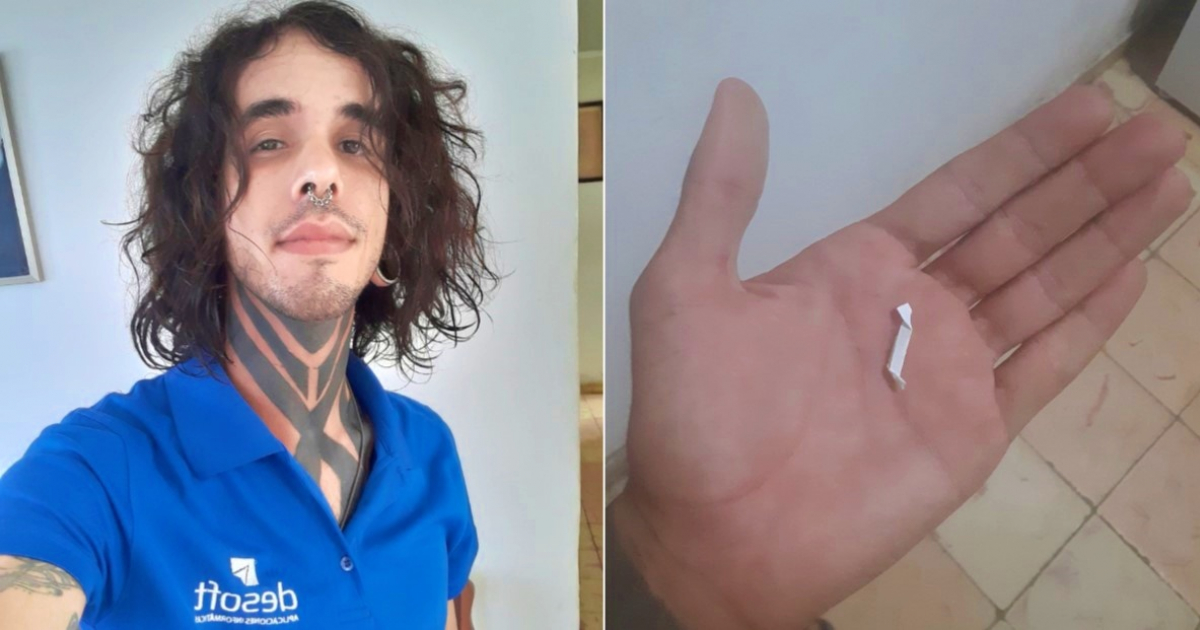A young Cuban man shared a harrowing experience on social media after witnessing three minors preparing to use the drug popularly known on the island as "el químico." He managed to prevent them from using it, despite being attacked by the children from whom he took the drug.
The individual, who goes by the name "Galletica Zokata de la Bodega" on Facebook, recounted that he was walking near the Obelisco in the Marianao municipality of Havana when he stopped to get a coffee. That's when he saw the minors asking for three cigarettes.
One of the kids, from whom he took the packet of drugs, already showed clear signs of being under the influence. Concerned by the scene, he approached the oldest one—an adolescent around 16 or 17 years old—and confronted him. However, the teenager only gave him a dirty look, prompting the young man to snatch the drugs from the child’s hand.
"How could I allow a kid who could easily be the child of one of my friends to do something like that right in front of me? The three of them slapped me a couple of times and tried to take my wallet," he described.
The teenager then pulled out a knife but only managed to graze the man's hand and abdomen before losing his grip on the weapon.
"Luckily, I didn't open my fist, and they couldn't take anything from me. They all ran away when they saw other people coming, likely mistaking them for the police," he added.
The Failures of the Communist Regime
In the final segment of his chilling account, the man pointed out that although the Cuban Revolution in 1959 promised a dignified life and the elimination of all types of "social ills," the implementation of the communist ideology has resulted in a failed social system that has not lived up to its promises.
He went on to list the "achievements" of the past six decades in Cuba, citing high levels of corruption, inflation, child prostitution, and an emerging drug trade, all under the shadow of a decaying public health system.
"So, friends, what have we achieved? Nothing. This is a message for all mothers, fathers, and my dear friends: Don't let go of your children. Drugs are around every corner and are clearly someone's business from above. It won't stop; the police do nothing except eliminate unnecessary competition," he concluded.
Rising Drug Use in Cuba
In recent months, numerous videos posted on social media have revealed the magnitude of the drug issue, showing young people completely out of control due to substance abuse.
In April, the Cuban government acknowledged the rise in drug consumption in the country, particularly the damage caused by "el químico," a synthetic cannabinoid sold at low prices and becoming the drug of choice, affecting increasingly younger individuals.
Dr. Alejandro García, a specialist in psychiatry and community mental health, explained to the official press a worrying trend of decreasing age of drug initiation, now between 13 and 14 years old, and a rise in usage among women, many of whom are pregnant.
The situation is exacerbated by the phenomenon of poly-drug use, or the mixing of different substances, complicating clinical cases.
García also highlighted the low perception of danger among Cuban families and urged them to be vigilant for signs of intoxication, typically resulting from drug consumption among adolescents.
The official source claimed that 99% of drug use occurs outside of schools, prompting authorities to urge families to report and break the cycle of drug distribution.
However, many Cuban families do not perceive the risk because they believe the issue exists but think it will not affect them.
He also acknowledged that hospital emergency rooms receive intoxicated patients who are difficult to treat because they consume substances without knowing their components.
Understanding Drug Use in Cuba
In light of the increasing drug problem in Cuba, it's important to address key questions and concerns about the issue. Below are some frequently asked questions and their answers:
What is "el químico"?
"El químico" is a synthetic cannabinoid that is sold at low prices in Cuba and has become increasingly popular, especially among young individuals.
What age group is most affected by drug use in Cuba?
Recent trends indicate that drug use is starting as early as 13 to 14 years old, with a noticeable increase among young women, including those who are pregnant.
What are the signs of drug intoxication in adolescents?
Signs of intoxication can include unusual behavior, impaired coordination, and physical symptoms such as glazed eyes or lethargy. Families should be vigilant for these signs.
How are the Cuban authorities addressing the drug issue?
Authorities are urging families to report drug distribution and break the cycle, although there is criticism that the police are not effectively addressing the problem.
